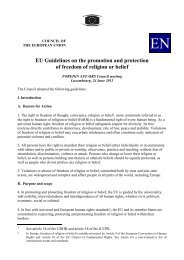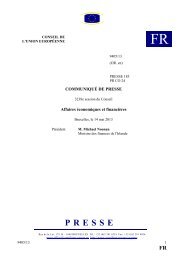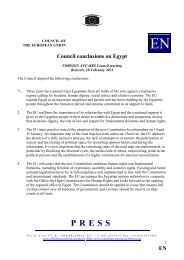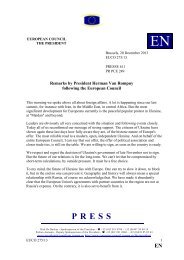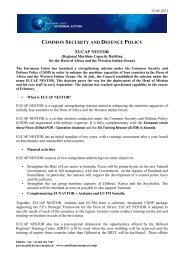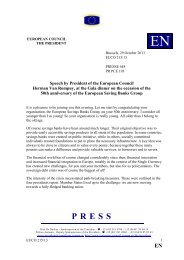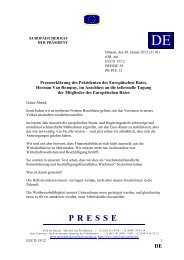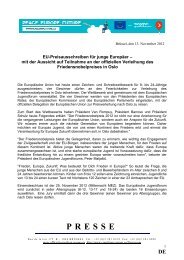14508/09 ADD 1 PL/vk 1 DG G COUNCIL OF THE ... - Europa
14508/09 ADD 1 PL/vk 1 DG G COUNCIL OF THE ... - Europa
14508/09 ADD 1 PL/vk 1 DG G COUNCIL OF THE ... - Europa
You also want an ePaper? Increase the reach of your titles
YUMPU automatically turns print PDFs into web optimized ePapers that Google loves.
5.7. Women in Power and Decision-making (G)<br />
It is important to note that both efforts and considerable progress have been made in most MS to<br />
increase participation by women in decision-making processes since 2003. The situation varies<br />
significantly between countries, between different decision-making bodies, including elected<br />
bodies, government bodies and corporate bodies, and between different levels of decision-making<br />
such as the national, regional, local and EU level. Thus, much remains to be done to improve the<br />
overall representation of women in decision-making across the Union.<br />
In recent years, the under-representation of minority groups in power and decision-making has been<br />
put on the political agenda. Increased diversity of migrants, growing numbers of newcomers being<br />
naturalised and the increased proportion of second generation descendants of migrants in many MS<br />
signal the changing composition of the population and the need to redress the imbalance, if<br />
demographically representative elected bodies are to be promoted. In the field of gender,<br />
furthermore, the issue of migrant and ethnic minority women and decision-making needs to be<br />
taken into consideration. It is vital here to address two issues; first, to what extent decision-making<br />
bodies represent minority groups, and second, to what extent decision-making bodies represent<br />
women, including minority women.<br />
EU commitments to achieve the objectives of the Beijing PfA<br />
Reviewing the indicators on political decision-making in May 2008 the Council of the European<br />
Union also encouraged governments and political parties and the social partners to develop further<br />
and implement effective measures to increase women's involvement and participation in decision-<br />
making and leadership, including training and mentoring schemes and other initiatives to encourage<br />
women to participate in political processes.<br />
In addition, quantitative and qualitative studies are needed on the outcome of strategies put in place<br />
in MS, including positive actions such as gender quotas. The exchange and dissemination of good<br />
practice should be promoted.<br />
<strong>14508</strong>/<strong>09</strong> <strong>ADD</strong> 1 <strong>PL</strong>/<strong>vk</strong> 138<br />
ANNEX <strong>DG</strong> G EN



